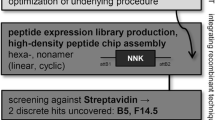Abstract
Understanding antibody specificity and defining response profiles to antigens continue to be essential to both vaccine research and therapeutic antibody development. Peptide scanning assays enable map** of continuous epitopes in order to delineate antibody–antigen interactions beyond traditional immunoassay formats. We have developed a relatively low-cost method to generate peptide microarray slides for antibody binding studies that allow for interrogation of up to 1536 overlap** peptides derived from the target antigens on a single microslide. Using an IntavisAG MultiPep RS peptide synthesizer and a Digilab MicroGrid II 600 microarray printer robot, each peptide is tagged with a polyethylene glycol aminooxy terminus to improve peptide solubility, orientation, and conjugation efficiency to the slide surface. Interrogation of the surface can then be performed using polyclonal immune sera or monoclonal antibodies, and sensitive detection using an InnoScan 1100 AL scanner with fluorescent-conjugated secondary reagents maximizes conservation of reagents.
Access this chapter
Tax calculation will be finalised at checkout
Purchases are for personal use only
Similar content being viewed by others
References
Plotkin SA (2010) Correlates of protection induced by vaccination. Clin Vaccine Immunol 17(7):1055–1065
Law M, Maruyama T, Lewis J et al (2008) Broadly neutralizing antibodies protect against hepatitis C virus quasispecies challenge. Nat Med 14(1):25–27
Strohl WR (2009) Therapeutic monoclonal antibodies: past, present and future. In: An Z (ed) Therapeutic monoclonal antibodies: from bench to clinic. Wiley, New York
Garces F, Sok D, Kong L et al (2014) Structural evolution of glycan recognition by a family of potent HIV antibodies. Cell 159(1):69–79
Jefferis R (2016) Posttranslational modifications and the immunogenicity of biotherapeutics. J Immunol Res 2016(9):1–15
Harmel R, Fiedler D (2018) Features and regulation of non-enzymatic post-translational modifications. Nat Chem Biol 14(3):244–252
Moore JP, Sodroski J (1996) Antibody cross-competition analysis of the human immunodeficiency virus type 1 gp120 exterior envelope glycoprotein. J Virol 70(3):1863–1872
Larman HB, Zhao Z, Laserson U et al (2011) Autoantigen discovery with a synthetic human peptidome. Nat Biotechnol 29(6):535–541
Mohan D, Wansley DL, Sie BM et al (2018) PhIP-Seq characterization of serum antibodies using oligonucleotide-encoded peptidomes. Nat Protoc 13(9):1958–1978
Christiansen A, Kringelum JV, Hansen CS et al (2015) High-throughput sequencing enhanced phage display enables the identification of patient-specific epitope motifs in serum. Sci Rep 5:12913
Chen F, Nagy K, Chavez D et al (2020) Antibody responses to immunization with HCV envelope glycoproteins as a baseline for B-cell-based vaccine development. Gastroenterology 158(4):1058–1071e6
Ruwona TB, McBride RChappel R et al (2014) Optimization of peptide arrays for studying antibodies to hepatitis C virus continuous epitopes. J Immunol Methods 402(1–2):35–42
Winkler DFH, Hilpert K, Brandt O, Hancock REW (2009) Synthesis of peptide arrays using SPOT-technology and the CelluSpots-method. Methods Mol Biol 570:157–174
Hilpert K, Winkler DFH, Hancock REW (2007) Peptide arrays on cellulose support: SPOT synthesis, a time and cost efficient method for synthesis of large numbers of peptides in a parallel and addressable fashion. Nat Protoc 2(6):1333–1349
Busch J, McBride R, Head SR (2010) Production and application of glycan microarrays. Methods Mol Biol 632:269–282
Acknowledgements
This work was partly supported by NIH awards AI158193 and AI168917 to ML, and a David C. Fairchild Endowed Fellowship, Skaggs Graduate School of Chemical and Biological Sciences, The Scripps Research Institute, to KN.
Author information
Authors and Affiliations
Corresponding author
Editor information
Editors and Affiliations
Rights and permissions
Copyright information
© 2023 The Author(s), under exclusive license to Springer Science+Business Media, LLC, part of Springer Nature
About this protocol
Cite this protocol
Nagy, K., McBride, R., Head, S.R., Ordoukhanian, P., Law, M. (2023). Low-Cost Peptide Microarrays for Map** Continuous Antibody Epitopes. In: Cretich, M., Gori, A. (eds) Peptide Microarrays. Methods in Molecular Biology, vol 2578. Humana, New York, NY. https://doi.org/10.1007/978-1-0716-2732-7_6
Download citation
DOI: https://doi.org/10.1007/978-1-0716-2732-7_6
Published:
Publisher Name: Humana, New York, NY
Print ISBN: 978-1-0716-2731-0
Online ISBN: 978-1-0716-2732-7
eBook Packages: Springer Protocols



